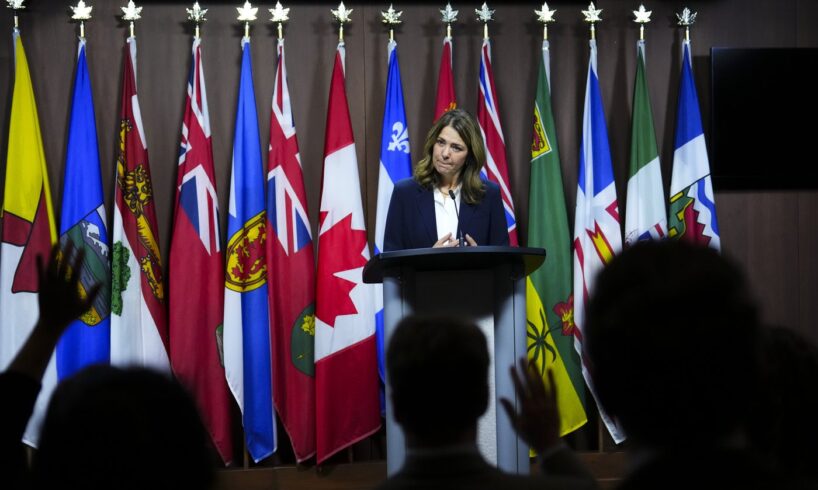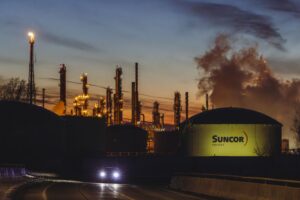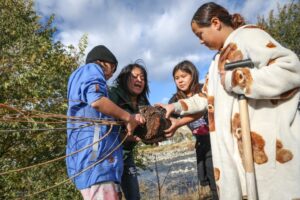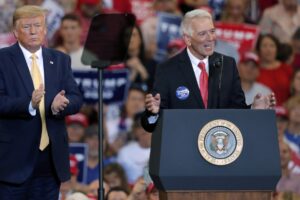
EDMONTON — The Alberta government says Ottawa is dodging responsibility by not standing behind the province’s planned proposal for a pipeline that would bring oil to the B.C. coast.
In a statement Friday, Premier Danielle Smith’s office said the decision to build a pipeline lies solely with Prime Minister Mark Carney and the federal government.
“We expect him to act decisively and in support of this project,” said spokesman Sam Blackett.
“Anything short of that will be a betrayal of (the) constitutional rights of Alberta’s citizens and calls into question whether Canada is a functional and law-abiding democracy.”
It comes a day after federal Natural Resources Minister Tim Hodgson told the Senate that if Smith wants the project to become a reality, she needs to get the B.C. government and affected First Nations on board.
“To build, you need support of the jurisdiction you build through, and you need the support of First Nations,” Hodgson said Thursday.
“Alberta has some work to do.”
Smith is pushing to get a new iteration of the Northern Gateway pipeline proposal submitted to the federal Major Projects Office by spring. The office aims to speed up projects deemed to be in the national interest.
Blackett said the federal government has control over interprovincial trade and commerce and the constitutional authority to regulate interprovincial pipelines.
“The reason for that is so a single parochial premier cannot block the export of the most valuable asset of five million Albertans,” he said.
“Surely, Minister Tim Hodgson understands Canada’s Constitution.”
In early October, Smith’s United Conservative Party government committed $14 million to fund early regulatory work in hopes of attracting a private investor to take over as a proponent and First Nations to take ownership stakes.
The project would depend on the federal government dropping some environmental laws, including its tanker ban on the West Coast.
Speaking to reporters in Ottawa, Carney was asked Friday if he supported a new pipeline to B.C.
He said the government believes in “nation-building projects,” but they must have material economic benefits, be consistent with climate objectives and provide benefits for Indigenous Peoples.
“This government will engage with proposals that have a possibility or prospect of achieving those,” Carney said.
Asked if he was considering dropping an emissions cap on oil and gas producers and the tanker ban, Carney said “it depends” on results.
He noted his government wants to see lower carbon conventional energy.
B.C. Premier David Eby has slammed the potential pipeline as “fictional,” saying it threatens the community support and social licence that would allow other major projects on the coast to move forward.
If there is to be a conversation, Eby said, it should be about a “real project” — not one that hasn’t secured a proponent, funding or environmental approval.
Smith, in turn, has called Eby’s rejection “un-Canadian” and “unconstitutional.”
The head of a group representing First Nations along B.C.’s coast has said they won’t support a new pipeline proposed by Alberta, and nothing can change that.
“Premier Smith’s continued talk of oil pipelines and tankers, and the risk of a catastrophic oil spill in B.C.’s coastal waters, is not nation-building,” said Heiltsuk Chief Marilyn Slett, president of Coastal First Nations.
An online survey conducted this week by the Angus Reid Institute suggests a majority of Canadians surveyed — 59 per cent — support a pipeline from northern Alberta to the northwest B.C. coast.
It also suggests support outweighs opposition in B.C., with 56 per cent in favour and 33 per cent opposed.
However, 52 per cent of respondents in B.C. said provinces along a pipeline route should be able to veto a project unless conditions are met.
Because the poll was conducted online, it can’t be assigned a margin of error.
This report by The Canadian Press was first published Oct. 10, 2025.
– With files from Nick Murray in Ottawa
Lisa Johnson, The Canadian Press





